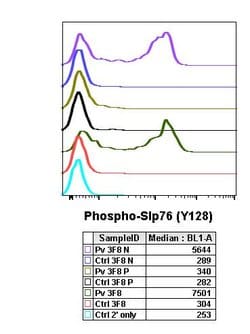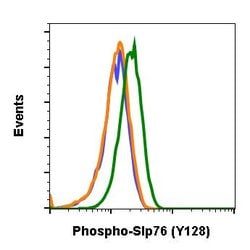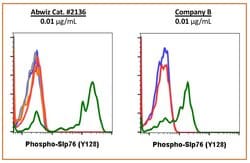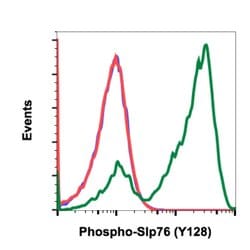Learn More
Invitrogen™ Phospho-SLP76 (Tyr128) Recombinant Rabbit Monoclonal Antibody (SLP76Y128-3F8)
Rabbit Recombinant Monoclonal Antibody
$408.50 - $621.50
Specifications
| Antigen | Phospho-SLP76 (Tyr128) |
|---|---|
| Clone | SLP76Y128-3F8 |
| Concentration | 0.5 mg/mL |
| Content And Storage | -20°C |
| Applications | Flow Cytometry |
| Catalog Number | Mfr. No. | Quantity | Price | Quantity & Availability | |||||
|---|---|---|---|---|---|---|---|---|---|
| Catalog Number | Mfr. No. | Quantity | Price | Quantity & Availability | |||||
|
PIMA528019
|
Invitrogen™
MA528019 |
200 μL |
Each for $621.50
|
|
|||||
|
PIMA536997
|
Invitrogen™
MA536997 |
20 μL |
Each for $408.50
|
|
|||||
Description
Recombinant rabbit monoclonal antibodies are produced using in vitro expression systems. The expression systems are developed by cloning in the specific antibody DNA sequences from immunoreactive rabbits. Then, individual clones are screened to select the best candidates for production. The advantages of using recombinant rabbit monoclonal antibodies include: better specificity and sensitivity, lot-to-lot consistency, animal origin-free formulations, and broader immunoreactivity to diverse targets due to larger rabbit immune repertoire.
SLP-76 was originally identified as a substrate of the ZAP-70 protein tyrosine kinase following T cell receptor (TCR) ligation in the leukemic T cell line Jurkat. The SLP-76 locus has been localized to human chromosome 5q33 and the gene structure has been partially characterized in mice. The human and murine cDNAs both encode 533 amino acid proteins that are 72% identical and comprised of three modular domains. The NH2-terminus contains an acidic region that includes a PEST domain and several tyrosine residues which are phosphorylated following TCR ligation. SLP-76 also contains a central proline-rich domain and a COOH-terminal SH2 domain. A number of additional proteins have been identified that associate with SLP-76 both constitutively and inducibly following receptor ligation, supporting the notion that SLP-76 functions as an adaptor or scaffold protein. Studies using SLP-76 deficient T cell lines or mice have provided strong evidence that SLP-76 plays a positive role in promoting T cell development and activation as well as mast cell and platelet function.Specifications
| Phospho-SLP76 (Tyr128) | |
| 0.5 mg/mL | |
| Flow Cytometry | |
| Unconjugated | |
| Rabbit | |
| RUO | |
| PBS with 0.1% BSA, 50% glycerol and 0.02% sodium azide; pH 7.4 | |
| Q13094, Q60787 | |
| 16822, 3937 | |
| A synthetic phospho-peptide corresponding to residues surrounding Tyr128 of human phospho SLP-76. | |
| Antibody |
| SLP76Y128-3F8 | |
| -20°C | |
| Recombinant Monoclonal | |
| Liquid | |
| IgG κ | |
| Human, Mouse | |
| LCP2 | |
| 76 kDa tyrosine phosphoprotein; AI323664; BB161688; Lcp2; Lymphocyte cytosolic protein 2; lymphocyte cytosolic protein 2 (SH2 domain containing leukocyte protein of 76kDa); lymphocyte cytosolic protein 2 (SH2 domain-containing leukocyte protein of 76kD); SH2 domain-containing leukocyte protein of 76 kDa; SH2 domain-containing leukocyte protein of 76kD; SLP76; SLP-76; SLP-76 tyrosine phosphoprotein; twm | |
| LCP2 | |
| Primary | |
| Protein A/G |
Your input is important to us. Please complete this form to provide feedback related to the content on this product.



